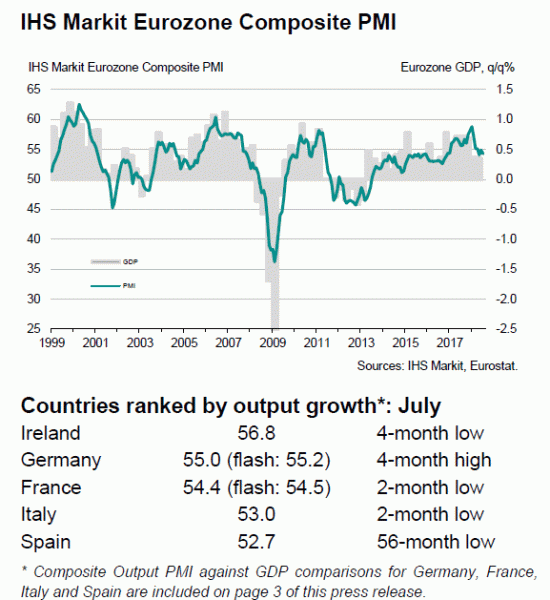Eurozone PMI services was finalized at 54.2 in July, revised down from 54.4. That compares to June’s final reading of 55.2. PMI composite was finalized at 54.3, down 0.6 from June’s 54.9.
Among the countries, Germany PMI composite was a 4-month high of 55.0. France PMI composite was at a 2-month low of 54.4. Spain PMI composite hit 56-month low at 52.7.
Rob Dobson, Director at IHS Markit said:
“The final PMI numbers confirm the euro area economy started quarter three on a softer footing. July saw rates of expansion in both output and new orders cede the momentum recaptured in the prior survey month, returning to a picture of sliding growth rates seen through much of the year-to-date. “If the headline index continues to track at its current level, quarterly GDP growth over the third quarter as a whole would be little-changed from the softer-thanexpected expansion of 0.3% signalled by official Eurostat data for quarter two.
“The outlook seems to be turning into a straight choice between the upturn being sustained at its current subdued pace or rising headwinds reining in growth further during the months ahead. On this front, downside risks are more prevalent, as the slower expansion in new order inflows during July was partnered by a tandem dip in business optimism to a 20-month low. Both are reflecting the uncertainty about global market conditions, especially given the ongoing rhetoric about trade wars and the potential spillover effects to the broader economy and to manufacturing in particular.
“Improved domestic demand may offset some of this in the near-term, but will need to strengthen further if it is to maintain that role. The faster growth seen in Germany, if sustained, should also help in this regard, especially if it can aid in reversing the weaker expansions seen in its eurozone partners such as France, Italy and Spain during July. However, given rising signs of slowdown and the current uncertain outlook, the ECB will likely maintain its cautious approach to policy at present.”

